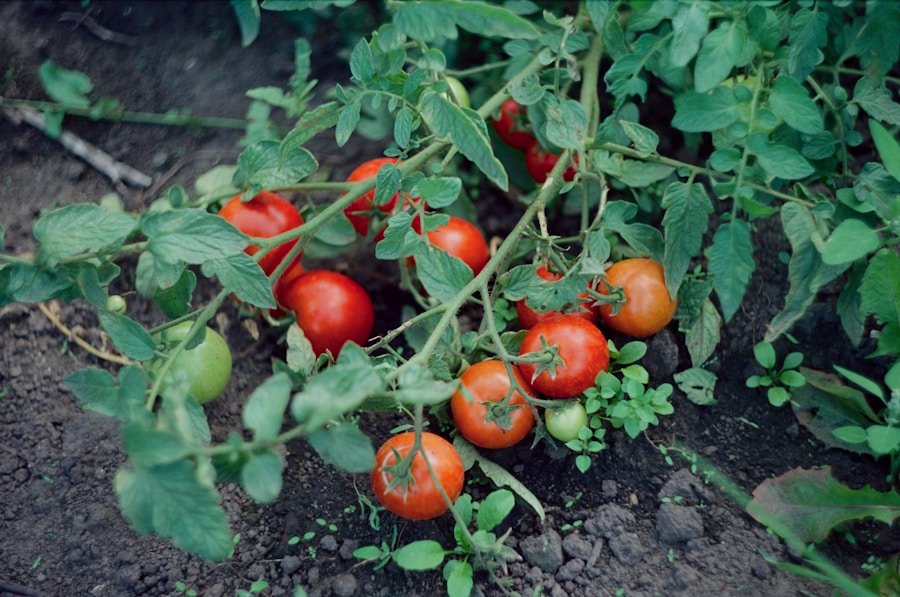Homegrown tomatoes necessitate a diverse range of nutrients to flourish and yield a plentiful harvest. The three primary macronutrients essential for tomato growth are nitrogen (N), phosphorus (P), and potassium (K). Nitrogen is vital for promoting leafy growth and overall plant vitality, while phosphorus plays a crucial role in root development and fruit production.
Potassium contributes to overall plant health and disease resistance. In addition to these primary macronutrients, tomatoes also benefit from secondary macronutrients such as calcium, magnesium, and sulfur, as well as micronutrients like iron, zinc, and manganese. Recognizing the nutritional requirements of homegrown tomatoes is vital for selecting the optimal fertilizer to promote healthy growth and abundant fruit production.
When considering the nutritional needs of homegrown tomatoes, it is essential to acknowledge that different stages of growth require varying nutrient ratios. For instance, during the early stages of growth, tomatoes benefit from a higher nitrogen ratio to promote robust vegetative growth. As the plants begin to flower and set fruit, a higher phosphorus ratio is necessary to support fruit development.
Understanding these changing nutritional needs throughout the growing season is crucial for selecting the most suitable fertilizer for your homegrown tomatoes.
Organic Fertilizers: A Natural Approach
Organic fertilizers are derived from natural sources such as compost, manure, and bone meal, and they provide a slow release of nutrients to the plants. They also improve soil structure and microbial activity, which can benefit the overall health of the tomato plants.
Synthetic Fertilizers: A Quick Fix
On the other hand, synthetic fertilizers are manufactured using chemical processes and provide a quick release of nutrients to the plants. They are often more concentrated and can be tailored to provide specific nutrient ratios for different stages of plant growth.
Choosing the Best Fertilizer for Your Tomatoes
Both organic and synthetic fertilizers have their advantages and disadvantages when it comes to growing tomatoes. Organic fertilizers are often preferred by those who want to avoid synthetic chemicals and promote soil health, while synthetic fertilizers are favored for their convenience and ability to provide precise nutrient ratios. Ultimately, the best fertilizer for homegrown tomatoes will depend on your specific gardening goals and preferences. Some gardeners may choose to use a combination of both organic and synthetic fertilizers to reap the benefits of each type. It’s important to weigh the pros and cons of each option and consider factors such as cost, availability, and environmental impact when making your decision.
Key Takeaways
- Homegrown tomatoes have specific nutritional needs that can be met with the right fertilizers.
- Organic fertilizers are a more sustainable option for homegrown tomatoes, but synthetic fertilizers can also be effective.
- Some top fertilizer brands for homegrown tomatoes include Dr. Earth, Jobe’s Organics, and Miracle-Gro.
- Proper application of fertilizer is crucial for maximizing tomato growth and yield.
- Balanced fertilization is important for maintaining the health of homegrown tomatoes and preventing common fertilizer problems.
Top Fertilizer Brands for Homegrown Tomatoes
There are countless fertilizer brands on the market, making it challenging to choose the best one for your homegrown tomatoes. Some top fertilizer brands that are highly recommended by experienced gardeners include Dr. Earth, Jobe’s Organics, Espoma, Miracle-Gro, and FoxFarm.
These brands offer a range of organic and synthetic fertilizer options that are specifically formulated for tomatoes and other fruiting vegetables. When selecting a fertilizer for your homegrown tomatoes, it’s important to look for a product that provides a balanced blend of nutrients, including nitrogen, phosphorus, and potassium, as well as secondary nutrients and micronutrients. In addition to considering the nutrient content of the fertilizer, it’s also important to look for products that are formulated for the specific needs of tomatoes.
Some fertilizers are designed to promote healthy root development, while others are tailored to support fruit production. It’s also helpful to read reviews and testimonials from other gardeners to get an idea of which fertilizer brands have been successful in promoting healthy tomato growth and high yields. Keep in mind that the best fertilizer for your homegrown tomatoes may vary depending on your specific growing conditions, so it’s important to experiment with different brands and formulations to find the one that works best for you.
How to Apply Fertilizer to Maximize Tomato Growth and Yield
Applying fertilizer correctly is essential for maximizing tomato growth and yield. One common method of applying fertilizer to homegrown tomatoes is through top dressing, which involves sprinkling the fertilizer around the base of the plants and then gently working it into the soil. This method allows the plants to absorb nutrients through their root systems as they grow.
Another popular method is foliar feeding, which involves spraying a liquid fertilizer directly onto the leaves of the plants. This method provides a quick boost of nutrients and can be especially beneficial during periods of rapid growth or fruit development. It’s important to follow the instructions on the fertilizer packaging when applying it to your homegrown tomatoes.
Over-fertilizing can lead to nutrient imbalances and potential damage to the plants, while under-fertilizing can result in stunted growth and poor fruit production. It’s also important to water your plants thoroughly after applying fertilizer to help distribute the nutrients throughout the soil and prevent burning of the roots. By applying fertilizer correctly and at the right times throughout the growing season, you can help maximize the growth and yield of your homegrown tomatoes.
The Importance of Balanced Fertilization for Tomato Health
| Fertilizer Type | Nutrient Content | Application Frequency | Pros | Cons |
|---|---|---|---|---|
| Organic Fertilizer | Derived from natural sources, contains macronutrients and micronutrients | Every 4-6 weeks | Improves soil structure, promotes microbial activity, environmentally friendly | May be more expensive, slower release of nutrients |
| Synthetic Fertilizer | Contains specific ratios of nitrogen, phosphorus, and potassium | Every 2-3 weeks | Quick release of nutrients, precise nutrient content | May leach into groundwater, can harm beneficial soil organisms |
| Slow-Release Fertilizer | Contains nutrients encapsulated in a coating that releases over time | Every 8-10 weeks | Convenient, reduces risk of over-fertilization | May be more expensive, limited control over nutrient release |
Balanced fertilization is crucial for promoting the overall health of homegrown tomatoes. Providing a balanced blend of nutrients helps ensure that the plants have everything they need to grow strong roots, lush foliage, and abundant fruit. In addition to primary nutrients like nitrogen, phosphorus, and potassium, balanced fertilization also includes secondary nutrients such as calcium, magnesium, and sulfur, as well as micronutrients like iron, zinc, and manganese.
These nutrients work together to support various aspects of plant growth and development, from photosynthesis and energy production to disease resistance and fruit quality. In addition to providing a balanced blend of nutrients, it’s important to consider the pH level of your soil when fertilizing homegrown tomatoes. Tomatoes prefer slightly acidic soil with a pH level between 6.0 and 6.8.
If your soil is too acidic or alkaline, it can affect the availability of nutrients to the plants. Regular soil testing can help you monitor the pH level of your soil and make any necessary adjustments to ensure that your homegrown tomatoes have access to the nutrients they need for optimal health and productivity.
Troubleshooting Common Tomato Fertilizer Problems
Nutrient Deficiency: A Common Issue
One common issue is nutrient deficiency, which can manifest as yellowing leaves, stunted growth, or poor fruit production. This can occur if your plants are not receiving enough of a specific nutrient or if the soil pH is preventing nutrient uptake.
Addressing Nutrient Deficiency
In this case, you may need to adjust your fertilization practices or make amendments to your soil to address the deficiency. By doing so, you can help your plants receive the necessary nutrients to thrive.
Nutrient Toxicity: A Hidden Danger
Another common problem is nutrient toxicity, which can occur if you over-fertilize your homegrown tomatoes or use a fertilizer with an imbalanced nutrient ratio. This can lead to symptoms such as leaf burn, wilting, or reduced fruit quality.
Preventing Further Damage
If you suspect nutrient toxicity, it’s important to flush the soil with water to help leach out excess nutrients and prevent further damage to the plants. By monitoring your plants closely and addressing any fertilizer problems promptly, you can help ensure that your homegrown tomatoes remain healthy and productive throughout the growing season.
Tips for Choosing the Right Fertilizer for Your Specific Tomato Variety
When choosing a fertilizer for your homegrown tomatoes, it’s important to consider the specific variety you are growing. Different tomato varieties have varying nutritional needs and growth habits, so selecting the right fertilizer can help support their unique requirements. For example, determinate tomato varieties tend to have a more compact growth habit and produce fruit over a shorter period, while indeterminate varieties have a vining growth habit and produce fruit continuously throughout the season.
In addition to considering growth habits, it’s also important to take into account factors such as disease resistance and fruit size when choosing a fertilizer for your specific tomato variety. Some varieties may benefit from a higher phosphorus ratio to support fruit development, while others may require additional calcium or magnesium to prevent common disorders such as blossom end rot. By researching the specific needs of your chosen tomato variety and selecting a fertilizer that aligns with those needs, you can help ensure that your homegrown tomatoes thrive and produce an abundant harvest.
In conclusion, understanding the nutritional needs of homegrown tomatoes is essential for selecting the best fertilizer to promote healthy growth and abundant fruit production. Whether you choose organic or synthetic fertilizers, it’s important to provide a balanced blend of nutrients that supports all aspects of plant growth and development. By applying fertilizer correctly and at the right times throughout the growing season, you can help maximize the growth and yield of your homegrown tomatoes.
Additionally, troubleshooting common tomato fertilizer problems and choosing the right fertilizer for your specific tomato variety can help ensure that your plants remain healthy and productive. With careful attention to fertilization practices, you can enjoy a bountiful harvest of delicious homegrown tomatoes year after year.
FAQs
What are the best fertilizers for homegrown tomatoes?
The best fertilizers for homegrown tomatoes are those specifically formulated for tomatoes, such as 5-10-5 or 10-10-10. These fertilizers provide the necessary nutrients for healthy tomato plant growth and fruit production.
What nutrients do tomatoes need from fertilizers?
Tomatoes require a balanced supply of nitrogen, phosphorus, and potassium, as well as other micronutrients such as calcium and magnesium. These nutrients are essential for healthy plant growth, strong root development, and the production of high-quality fruits.
When should I fertilize my homegrown tomatoes?
It is recommended to fertilize tomatoes at planting time and then again when the first fruits begin to form. After that, you can continue to fertilize every 4-6 weeks throughout the growing season, but be cautious not to over-fertilize as it can lead to excessive foliage growth at the expense of fruit production.
Can I use organic fertilizers for my homegrown tomatoes?
Yes, organic fertilizers such as compost, fish emulsion, or seaweed extract can be used for homegrown tomatoes. These natural fertilizers provide the necessary nutrients and also improve the soil structure and fertility over time.
How much fertilizer should I use for my homegrown tomatoes?
The amount of fertilizer to use for homegrown tomatoes depends on the specific product and the size of your tomato plants. Always follow the instructions on the fertilizer package and avoid over-fertilizing, as it can harm the plants and the environment.





